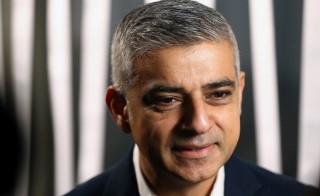(单词翻译:单击)
SADIQ KHAN, MAYOR OF LONDON: I am so proud that London has today chosen hope over fear, and unity over division.
DAVID TERESHCHUK, PBS NEWSHOUR WEEKEND CORRESPONDENT: When Sadiq Khan was elected mayor of London seven months ago, he became the first ever Muslim to lead a capital city in the Western world. During the campaign, his conservative opponent had made Khan's religion a big issue. Gillian Tett is the America's editor of the London-based "Financial Times."
GILLIAN TETT, FINANCIAL TIMES: There were dark insinuations that Sadiq Khan had somehow become associated with extremism, ultimate extreme Islamic ideas, and Sadiq Khan indicated very strongly that actually, he was very much part of the moderate wing of Islamic population who are trying to fight back against extremists.
DAVID TERESHCHUK: American political consultant Rod O'Connor watched the khan campaign closely.
ROD O'CONNOR, AMERICAN POLITICAL CONSULTANT: He's standing up and saying, "Look, I'm able to represent all people, I'm able to talk to all people. The core beliefs I have are not necessarily based on a religious doctrine."
People have tried to exploit questions around religious identity, and safety and security tied to religious identity, and this is a very — a very compelling example of a place where you can see that just doesn't work. People looked deeper; I think Sadiq gave them an opportunity to look deeper, and they made a choice.
DAVID TERESHCHUK: Khan says his priorities as mayor are developing affordable housing, investing in transportation infrastructure, preparing youth for the jobs of tomorrow, and ensuring London remains a place that welcomes migrants.
UNIDENTIFIED MALE: London is open.
SADIQ KHAN: At a time when our cities are becoming more diverse, the job of politicians is to make sure we make it easier to integrate, that we bust myths, we build bridges, if you like, rather than walls.

DAVID TERESHCHUK: For his part, Khan has reached out to Christian and Jewish and other religions to promote better inter-faith relations.
SADIQ KHAN: I have never held myself out as a Muslim leader. But it's a fact I'm a leader of Islamic faith, so that brings with that a responsibility, especially in current times. So, during the month of Ramadan for example, when I was fasting, it was brilliant that, you know, churches and synagogues around London invited me there. The archbishop of Canterbury invited me to Lambeth Palace, and the chief rabbi.
We invited a hundred children from every borough in London, and the archbishop and chief rabbi and I opened our fast together and took a brilliant selfie as well.
DAVID TERESHCHUK: That selfie went viral across Britain and globally. It's symbolic of Khan's common touch, which friends say stems from his upbringing in working-class south London.
KHAN: My life experiences have made me the person who I am.
DAVID TERESHCHUK: Khan's life began in London, the fifth of eight children raised by a bus driver and a seamstress who emigrated from Pakistan in the 1960s. The family lived in a public housing project notorious for its violence.
SADIQ KHAN: It was a tough housing project, and, you know, you've got a choice to either defend yourself, or to get beaten up and, you know, be the victim of bullying. So, at an early age, all of my brothers, I've got six brothers, and a sister, we joined the local boxing club, because it made you streetwise. You know how to look after yourself, how to make sure you're safe, really important. But there are other skills in boxing as well, how to be magnanimous, how to be a team player, how to keep fit.
DAVID TERESHCHUK:What do you think now that you're in the position you're in? Does street fighting still help?
SADIQ KHAN: Well, some say politics is street fighting, how to defend yourself, how to make sure you expose your opponent's weaknesses, how to always be moving, don't stand still — these are life-skills.
DAVID TERESHCHUK: Skills that Khan now deploys to connect communities that might not otherwise not associate, in a city where, by his count, 300 languages are spoken.
SADIQ KHAN: Listen, it's not perfect, but actually, we're a great city. You've got in London: Christians, Jews, Muslims, Hindus, Sikhs, Buddhists, those not members in an organized faith, rich, poor, old, young; all going on, interconnecting lives, breaking bread together, studying together, working together.
We can't have a laissez-faire attitude towards integration. We've got to think of our schools, about our colleges, about places of work — are we ensuring that everyone has a chance to fulfill their potential, to meet their neighbors and to get on?
DAVID TERESHCHUK: Khan has also encouraged religious and other minorities to report to law enforcement any and all hate crimes, which spiked upward after the U.K. voted last summer to leave the European Union.
SADIQ KHAN: The good news is that the police, and myself, and others, have a zero tolerance towards hate crime. We — the public has confidence to report it, which is very, very important. I'm a firm believer in stamping out at an early stage name-calling, verbal abuse, before it escalates. And I'm very pleased that, you know, we will carry on and be that great, great city that doesn't just tolerate difference, but respects it, embraces it, and celebrates it.


